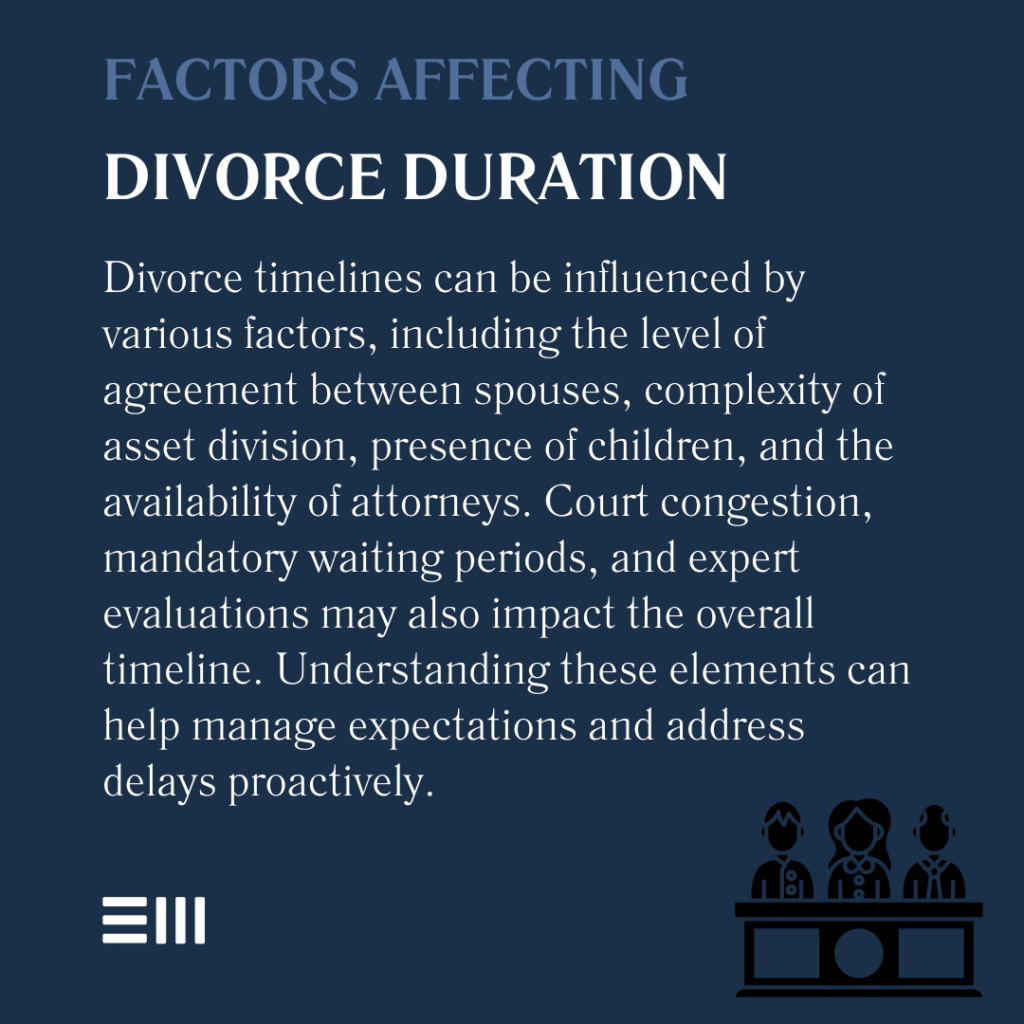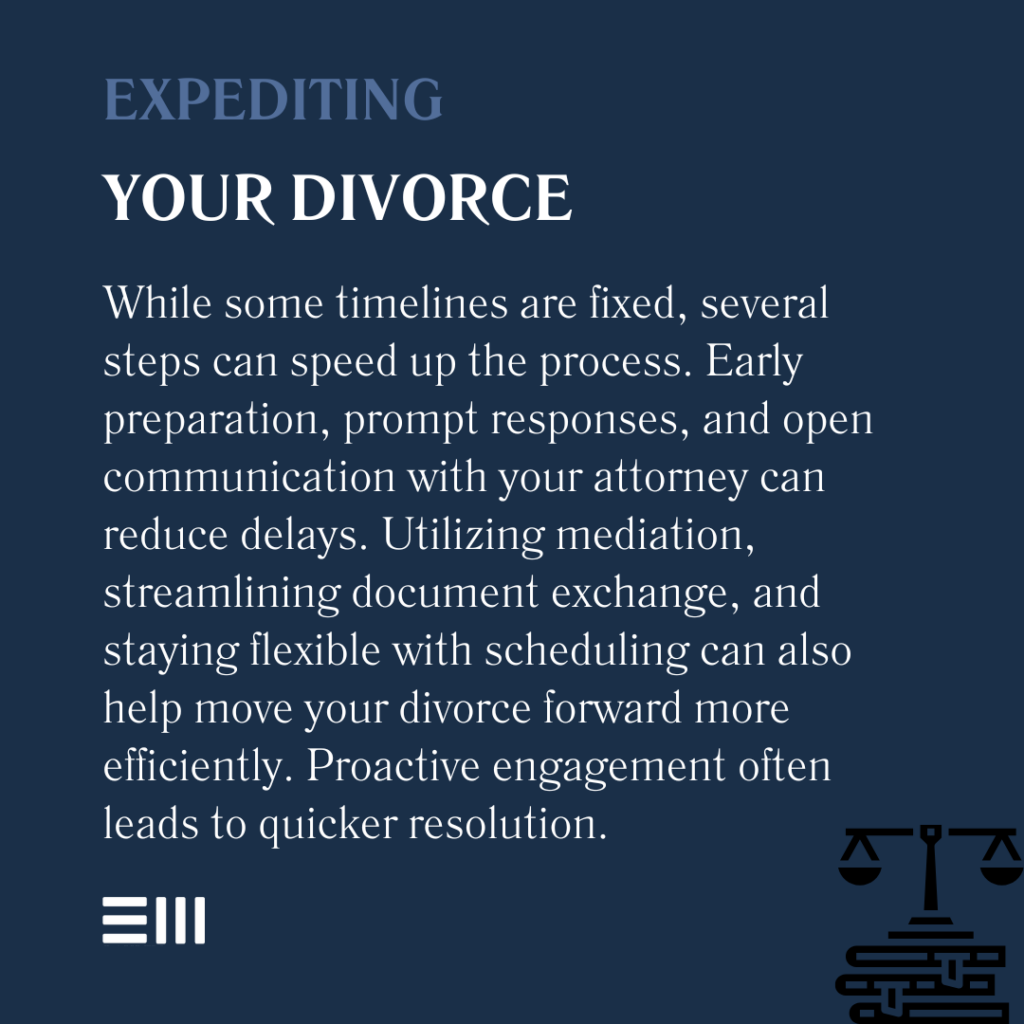
Time stretches differently when navigating divorce.
For some, the process feels like watching sand slowly drain through an hourglass, while others find themselves rushing to keep pace with rapid changes.
Every divorce story in Alabama unfolds at its own pace, shaped by unique circumstances, cooperation levels, and legal requirements that influence its journey through the court system.
The path to resolution varies as widely as the relationships themselves, making each timeline distinct yet governed by common legal frameworks.
Understanding Divorce Timelines in Alabama
The timeline for divorce in Alabama varies significantly based on several key factors. From the moment of filing until the final decree, each case follows its own path through the legal system, influenced by both state requirements and individual circumstances.
Understanding these timeframes helps set realistic expectations and allows for better preparation throughout the process.
The journey may include mandatory waiting periods, document processing times, and various hearings that all contribute to the overall duration. Even the simplest divorces must navigate certain legal requirements and waiting periods established by Alabama law.
Types of Divorce and Their Timelines
Alabama recognizes different types of divorce proceedings, each with its own typical timeline. The path you choose significantly impacts how long your divorce will take to complete.
Common divorce types include:
- Uncontested divorce (30-60 days);
- Contested divorce (6-12 months);
- Default divorce (45-90 days);
- Simplified divorce (30-45 days);
- Fault-based divorce (6-18 months);
- Collaborative divorce (3-6 months);
- Mediated divorce (2-4 months);
- Military divorce (varies based on deployment);
- High-asset divorce (12-24 months);
- International divorce (9-24 months);
- Bifurcated divorce (varies significantly); and
- Religious divorce (additional time requirements).
These timeframes serve as general guidelines, with actual durations varying based on specific circumstances and court schedules.
Each type brings its own set of requirements and potential complications that can affect the overall timeline.
Factors Affecting Divorce Duration in Alabama
Multiple elements can extend or shorten the time needed to complete your divorce. Understanding these factors helps explain why similar cases might progress at different speeds.
Key factors include:
- Level of agreement between spouses;
- Complexity of asset division;
- Presence of minor children;
- Court calendar congestion;
- Attorney availability and responsiveness;
- Required documentation completion;
- Mandatory waiting periods;
- Property valuation requirements;
- Custody evaluation timelines;
- Financial disclosure complexity;
- Mediation scheduling;
- Expert witness availability;
- Judge’s caseload;
- Holiday court schedules;
- Emergency motions or temporary orders;
- Interstate property considerations;
- Business valuation requirements;
- Retirement account division;
- Debt allocation complexity;
- Domestic violence allegations;
- Substance abuse evaluations;
- Mental health assessments;
- Guardian ad litem appointments;
- Real estate appraisals; and
- Tax implications and timing.
Each factor can add days or months to the process, making it essential to address them proactively. Understanding these elements helps in planning and managing expectations throughout the divorce journey.

Required Waiting Periods and Deadlines
Alabama law establishes specific timeframes that affect divorce proceedings. These mandatory periods ensure proper consideration of the decision and protect both parties’ rights.
Important timeline requirements include:
- 30-day residency requirement before filing;
- 30-day waiting period after filing;
- 20-day response window for served spouse;
- 10-day appeal period after final decree;
- 42-day deadline for financial disclosures;
- 90-day maximum for temporary orders;
- 60-day cooling-off period in some cases;
- 45-day mediation completion requirement;
- 30-day deadline for discovery responses;
- 14-day notice requirement for hearings;
- 7-day objection period for proposed orders;
- 21-day deadline for expert reports;
- 15-day period for motion responses;
- 30-day deadline for financial updates; and
- 10-day window for temporary relief hearings.
Understanding and planning for these required periods helps set realistic timeline expectations and ensures compliance with court requirements.
Court Procedures and Processing Times
The mechanics of court operations significantly impact divorce timelines. Understanding how courts process cases helps explain common sources of delay and opportunities for efficiency.
Key procedural elements include:
- Initial filing processing time (3-5 business days);
- Service of process requirements (varies by method);
- Scheduling conference timing (15-30 days after answer);
- Discovery period duration (typically 90-120 days);
- Motion hearing scheduling (30-45 days after filing);
- Mediation scheduling windows (45-60 days);
- Trial date assignment (90-180 days out);
- Order processing time (5-10 business days);
- Final decree preparation (7-14 days);
- Certificate of divorce issuance (5-7 days);
- Appeal filing periods (42 days);
- Transcript preparation time (varies by length);
- Court reporter availability;
- Judicial review periods; and
- Administrative processing requirements.
These procedural timelines help explain the overall duration of divorce cases and identify potential areas for expediting the process.
Expediting Your Alabama Divorce
While certain timelines remain fixed, several strategies can help move your divorce forward efficiently. Taking proactive steps often reduces unnecessary delays.
Effective approaches include:
- Gathering documentation early;
- Responding promptly to requests;
- Maintaining open communication;
- Working cooperatively with attorneys;
- Following court procedures precisely;
- Meeting deadlines consistently;
- Considering mediation options;
- Using online filing systems;
- Preparing financial statements ahead of time;
- Addressing issues proactively;
- Staying organized with paperwork;
- Avoiding unnecessary conflicts;
- Being flexible with scheduling;
- Planning for required waiting periods;
- Maintaining realistic expectations;
- Utilizing electronic discovery methods;
- Participating in early neutral evaluation;
- Considering settlement conferences;
- Using collaborative law approaches;
- Engaging in parallel planning;
- Preparing alternate dispute resolutions;
- Streamlining document exchange;
- Coordinating with experts early;
- Prioritizing issue resolution; and
- Maintaining calendar flexibility.
These strategies help minimize delays while ensuring proper handling of all legal requirements. Proactive engagement in the process often leads to more efficient resolution.

Common Causes of Delay
Understanding potential roadblocks helps in avoiding or minimizing their impact on your divorce timeline. Awareness of these issues allows for better planning and mitigation strategies.
Typical delay sources include:
- Incomplete financial disclosures;
- Disagreements over property values;
- Child custody disputes;
- Court calendar congestion;
- Expert availability issues;
- Discovery disputes;
- Procedural complications;
- Attorney scheduling conflicts;
- Mediation failures;
- Temporary order hearings;
- Appeals of interim orders;
- Complex asset division;
- International property issues;
- Business valuation disputes;
- Tax resolution requirements;
- Retirement account division;
- Real estate complications;
- Debt allocation disagreements;
- Mental health evaluations; and
- Substance abuse assessments.
Recognizing these potential delays helps in developing strategies to address them efficiently.
Frequently Asked Questions About Divorce Timelines in Alabama
Understanding the divorce timeline raises many questions for couples considering or beginning the process.
Here are answers to common questions about divorce duration in Alabama.
What’s the Minimum Time for a Divorce in Alabama?
The absolute minimum is 30 days from filing, though most cases take longer even with complete agreement between parties.
How Does Property Division Affect Timeline?
Complex property division can extend proceedings by months, especially when requiring professional valuations or involving business assets.
Do Children Affect How Long Divorce Takes?
Cases involving children typically take longer due to custody evaluations, parenting plan requirements, and the court’s careful consideration of the children’s best interests.
Can We Speed Up the Process?
While mandatory waiting periods cannot be shortened, cooperation and preparation can minimize other delays in the process.
What if My Spouse Won’t Respond?
Default divorce procedures can move forward after 30 days but may take 45-90 days to complete, depending on court schedules.
How Do Court Schedules Impact Timeline?
Court congestion can add weeks or months to proceedings, particularly in urban areas with high case volumes.
What Role Does Mediation Play in Timeline?
Successful mediation often shortens the overall timeline by resolving disputes without extensive court intervention.
How Do Appeals Affect Divorce Duration?
Appeals can extend the process by several months to over a year, depending on the complexity of the issues raised.
Start Your Journey Forward Today
Understanding divorce timelines helps you prepare for the road ahead. Our experienced family law attorneys can guide you through the process efficiently while protecting your interests.
Contact us to discuss your situation and develop a strategic timeline for your divorce that aligns with your goals and circumstances.
Can't find what you're looking for? Search our site below.










